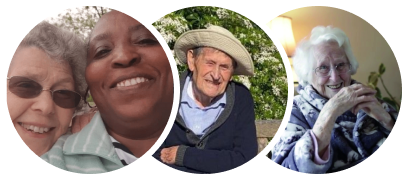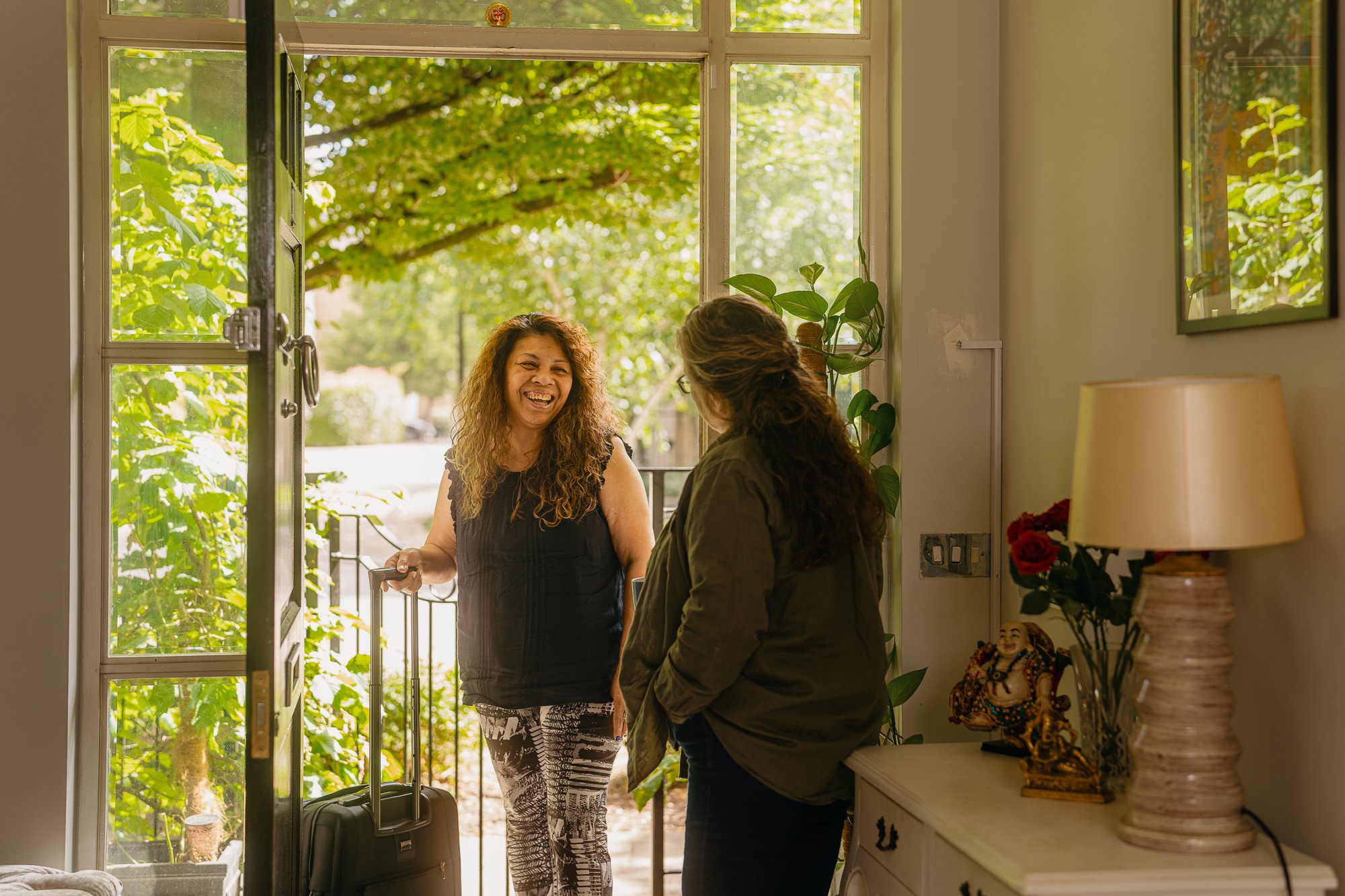Live-in Dementia Care
Find a qualified carer experienced in dementia to support your loved one on a full-time basis. Choose from a list of personalised matches and speak to them before making a decision.

Used by 5,000+ families across Great Britain

Our services
Our technology makes searching for a self-employed carer easier than ever before. Browse and chat to carers, and invite family members to help with the decision. Then, use your all-in-one MyElder account to control your care experience.
While we provide the tools, the agreement for how care takes place will sit with you and your self-employed carer. This keeps care personal, allowing you to work together to protect a loved one’s routine and way of life.
Full-time live-in care
A carer moves in to provide on-going 24hr support at home.
Short-term live-in care
A carer moves in to provide on-going 24hr support at home.
Visiting care
A carer will visit for a few hours on your chosen days, at a pre-agreed time.
The self-employed carers on the Elder platform fulfilling these services provide personal care, companionship, and daily living support. For more on what self-employed carers can and can’t do click here.
Why choose Elder for dementia care?
85% of us would want to stay in our own home if diagnosed with dementia. Finding a live-in carer through Elder can help your loved one maintain a high degree of independent living in their own home. Whether your loved one is living with Alzheimer’s, vascular dementia, or Parkinson’s, our platform can connect you to the right carer to help them keep a familiar and comfortable routine, while you get the peace of mind that someone is with them 24/7.

Personalised care
You can shape support around your loved one’s lifestyle. 98% of people receiving live-in care say it helps them have a better quality of life.
*Source: The Live in Care Hub

24/7 peace of mind
Choose a self-employed carer who’s profile showcases the skills you’re looking for to manage difficult dementia symptoms, and see how things are going at any time via your MyElder account.

Spend quality time as a family
A self-employed live-in carer takes caring responsibilities off of family members, allowing you to spend meaningful time with your loved one.

Flexible to your loved one's needs
With unlimited carer matching you can feel confident in finding the right self-employed carer at the right time as dementia progresses.
What can a self-employed dementia carer do?
Live-in dementia caregivers can perform a range of domestic and personal care duties to support wellbeing. Exactly what your carer will support with will be bespoke to the care requirements you share with your carer in your MyElder account, but common tasks may include –
Getting out and about
A dementia caregiver can drive an older person to see friends, run errands and attend their medical appointments. Or, they can arrange taxis or accompany them on public transport.
Maintain a routine
Patterns in everyday life help those with dementia know what to expect and to continue achieving some things on their own. Carers can help ensure they stick to set times for meals, bathing, and seeing friends.
Medication reminders
Carers help ensure any medication is taken at the right time, at the right dose (as per the prescription instructions)
Wandering prevention
Dementia caregivers help prevent people from wandering by planning activities to reduce restlessness and offering reassurance during moments of confusion.
Managing symptoms
Dementia affects everyone differently, carers will be able to provide specialist support to help with anything from confusion to sundowning.
Supervision
Having someone in the home 24/7 helps prevent accidents, for example if an older person forgets to turn the oven off.
Household chores
From vacuuming and sanitising surfaces, to laundry and staying on top of clutter, carers can help keep the house clean and tidy to ensure it’s safe, comfortable and relaxing.
Mobility
Carers can help keep older people moving and encourage gentle exercise. They can also ensure any activity advised by a medical professional is followed.
Personal care
Carers will provide discreet and sensitive support with intimate tasks such as washing and toileting. They can also offer a delicate, reassuring hand to get into clothes and help a person look their best.
Companionship
Carers will be there to listen and chat to, encourage hobbies, and help an older person to maintain an active and fulfilling social life.
Pet care
For pet owners, a carer can help feed, exercise, and clean up after household pets.
Preparing meals
They'll provide nutritious meals to suit individual tastes and dietary requirements, and ensuring hydration is prioritised.
Find your ideal carer
We have connected over 5,ooo families and carers across Great Britain. Search for yours today.
How it works
We’ve built a platform that makes it easier for families and self-employed carers to find each other, build ongoing relationships, and access dedicated support when they need it.
Share your care request
Tell us your care requirements using our simple request form. This includes the type of care you’re looking for, any specialist care or skills you need, and what daily life looks like.
Select your carer
You’ll start receiving profiles of carers you’ve been matched with in 24 hours. You can chat online to carers you’d like to know better, or arrange a phone or video call, before choosing who you like best.
Manage care
Use your online MyElder account to communicate with your chosen carer and the Elder support team, manage your care schedule, and set up secure payment.
“We used to have Helping Hands to care for our mum with dementia and when we started having problems with them we asked Elder to take over the live in care. What a difference, fantastic staff, great communication and the carer we have is absolutely fantastic!”
– Jane
“Andrea was an experienced ex-nurse and coped with our family member’s deteriorating situation with unstinting good humour and kindness. “
– Jen
“Elder have been amazing matching my mother with an experienced dementia live-in carer. Within a week, my mother is settled and we cannot believe the change is our mother’s as she is much calmer and happier. “
– Karen
Find the cost of care in your area
Enter your postcode below to view the average cost of live-in care and meet local self-employed carers
Live-in care
Families pay from £1150 p/w
- No joining fee
- Up to 2 wake-ups per night
- Trial period
- Carers don’t charge extra on bank holiday
Short-term care
Families pay £684 for 3 days | £1595 p/w
- No joining fee
- Up to 2 wake-ups per night
- Carers don’t charge extra on bank holiday
Colin and Dulcie's live-in care story
Dulcie is 102-years-old and lives with her son Colin, his wife Mary, and her Carer Sarah. She has dementia and has had full-time live-in care for over two years.
We talk to the family about the challenges of finding the right care solution for a fiercely independent woman – and how the positive benefits of live-in care with Sarah has transformed all of their lives.
As seen in




FAQs
About live-in care
Once you’ve created your MyElder account, you’ll need to complete some online clinical suitability questions and submit a ‘Care Request’. This can often be completed in under 10 minutes, and ensures Elder’s platform is right for your needs, and gives us the essential information we need to kick off the carer matching process. Questions cover –
- Basic information such as the name, age and location of the person needing care
- medical conditions
- mobility level
- hobbies and interests
- discrimination risk
Once submitted, our ElderMatch technology will use your answers to shortlist suitable self-employed carers. You’ll usually recieve the profiles of suitable carers within 24 hours.
Profiles contain details of the carers experience and background, and feedback they’ve recieved from other families. You’ll also be able to view a short introductory video from the carer to get to know them a little better.
You can invite other family members / decision makers to your account to help review potential carers, and can use the chat feature in MyElder to message the carers you’re interested in, and arrange a phone / video call with them.
If you’re unsure what to ask potential carers, we have some suggestions here. Once you’ve found a self-employed carer you’d like to work with, click ‘accept’ on their profile. For more tips for choosing the right carer for your needs, click here.
You can create your MyElder account by clicking this link.
Creating an account is free, and there’s no obligation to move forward with Elder once you’ve created your account.
Our Care Request questions have been developed by our in-house clinical team to automatically screen whether Elder’s services are appropriate for your needs. If your answers indicate that the level of care needed falls outside the scope of what a self-employed carer on our platform can provide, you’ll be notifed and have the chance to speak to one of our team for guidance on what to do next.
Yes, if you would like to work with more than one self-employed carer, for example, if you’d like one daytime and one nighttime carer, simply submit a separate care request for each – detailing the the needs each carer will be supporting with.
Because we’re a marketplace operating across Great Britain we can often connect families to self-employed carers within 24 hours. In some urgent instances, we’ve facilitated matches same day.
Yes, we give you the choice if you’d prefer a male or female carer, simply let us know if you or your loved one has a preference.
Yes. Every carer who joins our platform must have a good level of written and spoken English.
If you’d prefer a carer who also speaks a second language, simply let us know.
Many families use Elder Chat in your MyElder account to introduce themselves to their carer and arrange a follow-up phone or video call. If your carer is nearby and available, you may also be able to arrange a face-to-face meeting between yourselves before their first day.
A carer who moves into your loved one’s home will need their own space in which to sleep and spend time when they are not actually providing care. Most commonly, a carer will have a bedroom of their own, but if this is not practical, you could adapt a reception room or study for them to use – as long as it’s a private space i.e not a thoroughfare to another room or in regular use by other family members during the day.
The live-in carer will not need a bathroom of their own, although this would be preferable. They will need clean and functional bathroom facilities that they can use, and if sharing a bathroom, there should be somewhere for them to store toiletries.
We also recommend setting up a WiFi connection if you don’t have one already. The internet is useful for many things, including keeping in touch with Elder, which can be even more important if you live in a rural location with poor phone signal.
The carer will prepare meals and probably eat with you / your loved one, so separate dining facilities will not be needed. We’d recommend budgeting £40 per week for the carer’s food. However, if you’d like us to arrange it, we can add it to your weekly payments.
If the carer has any special dietary requirements they may prefer to provide their own food. We recommend discussing this with your chosen carer to come to an agreement that everyone is happy with.
Self-employed carers will usually work between 8-12 hours per day.
Yes. The self-employed carers on Elder’s platform provide personal care, which may include –
- toileting and continence
- washing and bathing
- getting dressed
- oral care
- hair care and grooming
- medication prompting
Some people may feel uncomfortable accepting help with intimate personal care tasks. If this is the case, it’s really important to detail how much support or supervision is needed, and any measures that may make things more comfortable in your Care request and Care Profile This will ensure your self-employed carer has all the information they need to support you / your loved one.
Please note, the self-employed carers on the Elder platform will not be expected to undertake Stoma care, PEG care, Wound care, Ventilation and oxygen support, e.g BiPAP or CPAP Support, Specialist drug administration, including Controlled Drug Administration, Covert Medication Administration, Glucose readings via finger pricks, Injections, Pessaries, Enemas, Suppositories, or Catheterisation
For more information, visit our quick guide for customers.
Yes, self-employed live-in carers can provide occasional night-time support, for example, helping the person they’re caring for get to the toilet, or providing reassurance if they wake up confused.
Carers expect to assist with night-time disturbances up to 2x per night for around 15 minutes on average. If your loved one requires more support than this, you’ll need to make alternative arrangements, such as waking night care. Live-in carers must get enough rest, so a self-employed carer should not expect to exceed these waking times unless he/she is a waking night carer.
For more information, visit our quick guide for customers.
While self-employed live-in carers aren’t professional cleaners, they can support with some light housework as part of their weekly duties. This may include –
- wiping down surfaces
- vacuuming and mopping floors
- emptying rubbish bins
- laundry
- changing bed linens
Expectations around household cleaning should be discussed and agreed upon with your carer before they begin the placement.
Self-employed carers are not expected to perform deep-cleaning tasks. It’s recommended that you enlist the services of a professional cleaning company for deeper cleaning or specialist expertise.
When your live-in carer takes time off you can use Elder to search for a self-employed respite carer to cover their break. Here’s how the process works –
- Together, you’ll discuss when they plan to take their break.
- They’ll then book their time off via our carer platform – The ElderHub.
- The dates will be automatically advertised on the ElderHub, and other carers will be able to apply to cover the period.
You can then choose from applicants, following the same process you used to select your first carer on MyElder.
Your primary carer will also receive the respite carer’s details so they can discuss key aspects of your loved one’s care and plan a smooth handover. For more information, click here. (link tbc)
If you choose to make private arrangements or have a family member step in to provide care instead, remember to let us know so that we can pause your care schedule to ensure you’re not invoiced for this period.
Yes, a number of families use funding to cover all or part of their care costs.
Depending on your financial situation, you may qualify for some level of live-in care funding from your local council. If you don’t qualify you may decide to use savings, or release money from your home.
Some people with long-term complex health needs are eligible for social care arranged and funded in full by the NHS. However it’s worth noting that this funding is reserved for those with more intensive health and care needs, meaning those who qualify may require specialist care, for example PEG feeding or stoma support. This falls outside of what an introductory service like Elder can facilitate.
For information on funding options, please take a look at our ‘Funding your Care’ guide.
About Elder
We understand that families put a lot of trust in the self-employed carers on our platform, so to join our platform carers must pass the following suitability screening –
- Have previous experience providing care either in people’s homes, or in a care home or specialist facility. We don’t accept personal care experience alone.
- Have a good understanding of the English language (written and spoken)
- Have a valid form of photo I.D
- Have the Right to Work in the UK
- Have the ability to pass an enhanced DBS check (England and Wales only)
- Be able to provide at least 2 verifiable professional references
- Complete situational judgement and character screening
You can create your MyElder account by clicking this link.
Creating an account is free, and there’s no obligation to move forward with Elder once you’ve created your account.
Elder is an online marketplace connecting families needing care to self-employed carers. We use technology to match you to the most suitable carers and allow you to choose the carer you feel best fits your needs.
We also give you the simple online tools you need to manage care. And, unlike with a care agency, your care agreement will be between you and your self-employed carer. This gives you complete control over the care experiences, ensuring your loved one is cared for in a way they’re comfortable with – protecting independence, dignity, and routine.
You can find out more about how Elder works here.
We recommend all self-employed carers using our platform take out the relevant insurance. We’ve partnered with a third-party insurance company – Fish Insurance to make this process easier for self-employed carers.
At Elder we help families and self-employed carers do three critical things safely: (1) find each other, (2) match with each other and (3) manage their ongoing relationship directly. We enable this through the development of technology and processes that families and carers use. The agreement for care is between the customer and the self-employed carer – therefore Elder is not required to be registered with the Care Quality Commission or the Care Inspectorate.
However, everything we do at Elder is underpinned by respect, transparency, safety, and integrity. You can read our full safety and trust policy here.
You can find our full list of policies and standards here.